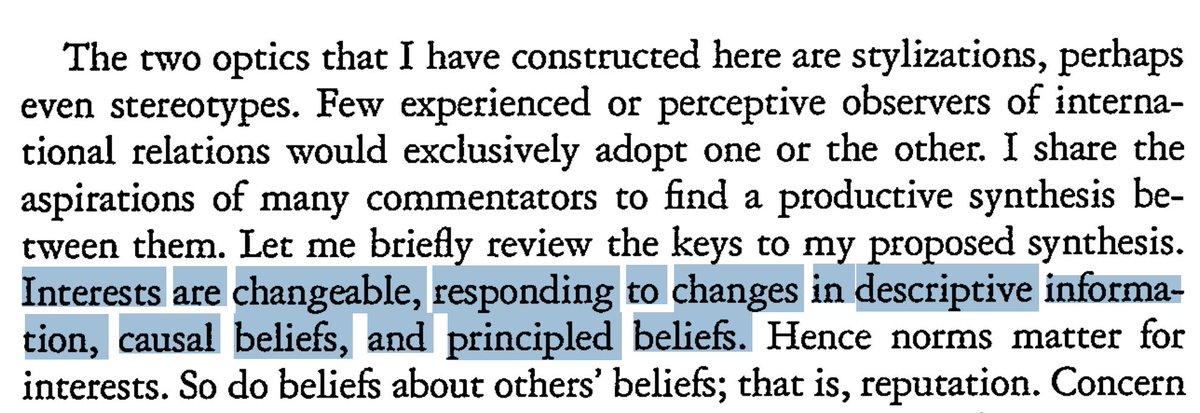
Teach/research int. politics, climate, science in societies. City of Cambridge, University of Leeds, Kingdom of Denmark - not all rotten. @olafcorry.bsky.social
How to get URL link on X (Twitter) App

https://twitter.com/mkrasnik/status/1745431326801449461Vi skal forstå: at anklage Israel for folkemord skubber freden længere væk fordi det "vækker historiske traumer og stærke følelser" - hos Israelere. Det er deres følelser Krasnik kærere sig om, forstås. De skal ikke konfronteres i retten, det er bare 'spektakulært' - et stunt.


https://twitter.com/hollyjeanbuck/status/1304044895221448705We posit "If the concept of stratospheric aerosol injection leaves the realm of modeling, it will be thrust into a multi-societal science–media-policy interface that operates in ways not currently anticipated—at least not in idealized model simulations/ governance scenarios". /2
https://twitter.com/C2G2net/status/1295995429444816900A global solar manipulation system with single point delivery (if it were possible) is unlikely to facilitate a more decentralised set of power relations globally. In my view it's also not likely to be created without a concomitant concentration of geopower.

https://twitter.com/GernotWagner/status/12733478869322055742/ This model of #climate negotiations with #geoengineering it is claimed 'simplifies to the basic form' of climate diplomacy. But how climate diplomacy works is precisely what is in question in this new simulation by @GernotWagner and @adrien_fabre . nature.com/articles/s4159…
https://twitter.com/ole_waever/status/1261297377287299072From Buzan & Wæver's short reply in SD: "if one is interested in ..racism in relation to the formation of securitization theory, the obvious source to examine would be Wæver et al. (1993).(..) This is all about the risks involved in European security turning towards security..
https://twitter.com/OlafCorry/status/12536155840356392973) But certain countries have..a bad track record. Saudi Arabia is not only captured by fossil interests (like US) it IS a fossil fuel state and has more reasons than most to fear decarbonization. It has blocked progress systematically on mitigation. Depledge has written on this.



 2. Under heading 'How do things look in the UK?' The reader is told and shown twice that there is an "expected pattern" that the UK has so far followed: a doubling of cases every 3 days. OK fine?
2. Under heading 'How do things look in the UK?' The reader is told and shown twice that there is an "expected pattern" that the UK has so far followed: a doubling of cases every 3 days. OK fine? 
https://twitter.com/JesseLReynolds/status/1239862427572940800b) is symmetry necessarily an ideal - should researchers randomly pick things to study, or study 'one of each' from some categories (and if so which categories)? Why do you focus on geoengineering yourself, and not radical mitigation strategies? Is that a problematic asymmetry?




https://twitter.com/DrRobBellamy/status/12040721595613552652. Should we in the name of expanding options consider 'natural/tech' distinction obsolete because we have affected nature?

 Groups like XR seek to use "higher voltage" political impulses to jolt the system and overcoming unresponsiveness/disconnection of traditional climate politics. Generate renewable distributional energies triggering broader support and contagious political shifts.
Groups like XR seek to use "higher voltage" political impulses to jolt the system and overcoming unresponsiveness/disconnection of traditional climate politics. Generate renewable distributional energies triggering broader support and contagious political shifts.

 2. Since the international track is effectively stymied by the US (and other fossil-lobby captured states) city-level is limited but increasingly important.
2. Since the international track is effectively stymied by the US (and other fossil-lobby captured states) city-level is limited but increasingly important. 
https://twitter.com/DKeithClimate/status/11206876838634987522. This is an interesting stab at problem-solving seen from the perspective of a would-be geoengineering state aiming to 'overcome opposition' from other rational self-interested states. Doesn't look at value-based opposition or mitigation-deterrence problems.
https://twitter.com/JesseLReynolds/status/11060652154335109132/9 Firstly the knowledge-gap thesis is doubtful as the main protagonist countries were not, imo, at beginning of a steep learning curve. They knew their stuff. They did, however, have very different interpretations of the epistemic politics of geoengineering.